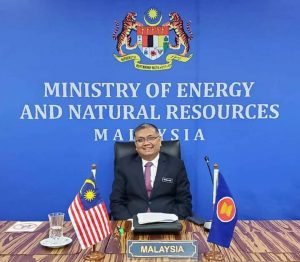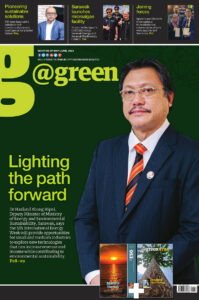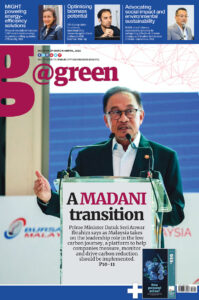Shamsul affirms targets
KeTsa Minister also emphasised that Malaysia’s energy transition plan should be an affordable one
Malaysia has targeted 31 per cent Renewable Energy (RE) in its installed capacity in 2025 and 40 per cent by 2035 as its energy transition plan by 2040.
Energy and Natural Resources Minister Datuk Seri Dr Shamsul Anuar Nasarah shared Malaysia’s plans with other Asean Ministers of Energy and representatives, gathered virtually at The Special Meeting of ASEAN Ministers on Energy and the Minister of Economy, Trade and Industry of Japan on June 21.

The meeting was chaired by Nguyen Hong Dien, Minister of Industry and Trade of Viet Nam, and co-chaired by H.E. Kajiyama Hiroshi, Minister of Economy, Trade and Industry of Japan. The Secretary-General of ASEAN was also in attendance.
Shamsul shared Malaysia’s energy transition plans until 2040, which focused on its power generation plan during the meeting. Shamsul also shared Malaysia’s target of 31 per cent Renewable Energy (RE) in its installed capacity in 2025 and 40 per cent in 2035.
He said the installed capacity for RE in Malaysia was 7,995MW. By 2035, the RE installed capacity is projected to more than double to 18,000 MW.
“To increase the share of RE in the power capacity mix, the government would be focussing on Peninsular Malaysia as it accounts for 80 per cent of Malaysia’s electricity demand,” said Shamsul.
“Out of the 31 per cent RE target in 2025, 26 per cent will come from Peninsular Malaysia in 2025. And, out of the 40 per cent target in 2035, Peninsular will account for 32 per cent.
“RE capacity in Peninsular is projected to increase from the current 4,430MW to 10,944MW in the next 15 years. As solar has the highest potential, Malaysia plans to introduce battery energy storage systems (BESS), with a total capacity of 500MW from 2030 onwards.”
Shamsul said with these RE targets, the carbon emission intensity from the power sector was set to be reduced by 45 per cent in 2030. A further 60 per cent in 2035, compared to the 2005 level, is in line with Malaysia’s Nationally Determined Contributions (NDCs) targets under the Paris Climate Agreement.
The Minister also emphasised that Malaysia’s energy transition plan should be an affordable one in line with the Sustainable Development Goal 7 of ensuring access to affordable, reliable, sustainable and modern energy for all.
Solar has the highest potential
“Therefore, while Malaysia is pushing for a higher target of RE in its capacity mix, the Ministry also takes into account the affordability of the energy transition to the rakyat and the resiliency of Malaysia’s energy system.
“More than 7000 MW of coal power plants’ Power Purchase Agreements (PPAs) would expire by 2033 and be replaced chiefly by gas and RE, lowering Malaysia’s carbon emissions.
“Although Malaysia will not be building new coal power plants, the Ministry does not discount the option of extending the operation of these plants,” added Shamsul.
However, the extension of these plants will depend on the future availability of technologies in reducing emissions and the cost of adopting those technologies.
As solar has the highest potential in Peninsular, most of Malaysia’s RE will be contributed by solar. Hence, the Ministry will introduce utility-scale battery energy storage systems (BESS) with a total capacity of 500MW from 2030-2034.
In conclusion, the Minister stated that Malaysia’s energy transition towards a lower carbon pathway is not without its challenges. Hence, ASEAN will continue to work together with various dialogue partners and international organisations to achieve its sustainable energy goals.
Malaysia values the support offered by Japan to further enhance its policies and programmes, which will assist in transitioning our energy systems towards a lower carbon pathway.
“Malaysia welcomes Japan’s Asia Energy Transition Initiative (AETI) in providing support in terms of expertise, knowledge sharing and capacity building to develop a sustainable, affordable and reliable energy future for Asean,” concluded the Minister.
In conjunction with The Special Meeting of ASEAN Ministers on Energy and the Minister of Economic, Trade and Industry of Japan, the ASEAN ministers and the Minister of Economic, Trade and Industry of Japan adopted a Joint Statement on “Enhancing Partnerships in Realising Energy Transitions in ASEAN”.








